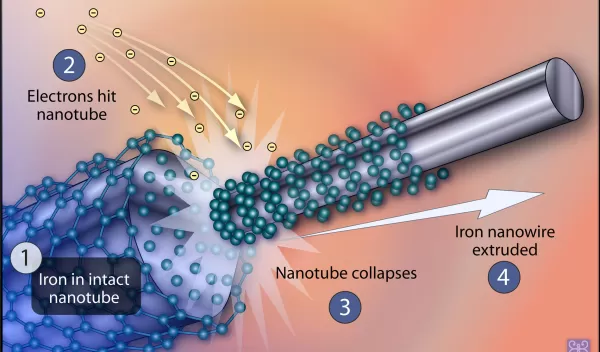
Nanotubes Not for Toothpaste . . . Yet
When researchers fire electron beams at multi-layered carbon nanotubes, they collapse, much like a tube of toothpaste, with such force the nanotubes extrude whatever may be inside, even extremely hard iron carbide. The process--which has applications for manufacturing durable, metal nanowires and similar materials--creates pressures within the tubes that reach one-tenth the crushing force in the Earth's core.
National Science Foundation-supported researcher Pulickel Ajayan of Rensselaer Polytechnic Institute (RPI) worked with an international team to develop the process. First, the researchers constructed long nanotubes of onion-like layers of carbon containing a 9-nanometer (billionth of a meter) core of iron or iron carbide, and then they blasted the tube with a beam of electrons. The tube collapsed, extruding an iron-carbide wire only 2 nanometers in diameter. What's more, the tube neatly pinched off the wire's end where the tube collapsed completely.
The findings appeared in the May 26, 2006, issue of the journal Science. Florian Banhart of Johannes Gutenberg University in Mainz, Germany, led the team, which included colleagues at the Institute for Scientific and Technological Research in San Luis Potosi, Mexico, and the University of Helsinki in Finland.
Additional information is available in the RPI press release linked below.
-- Josh Chamot


